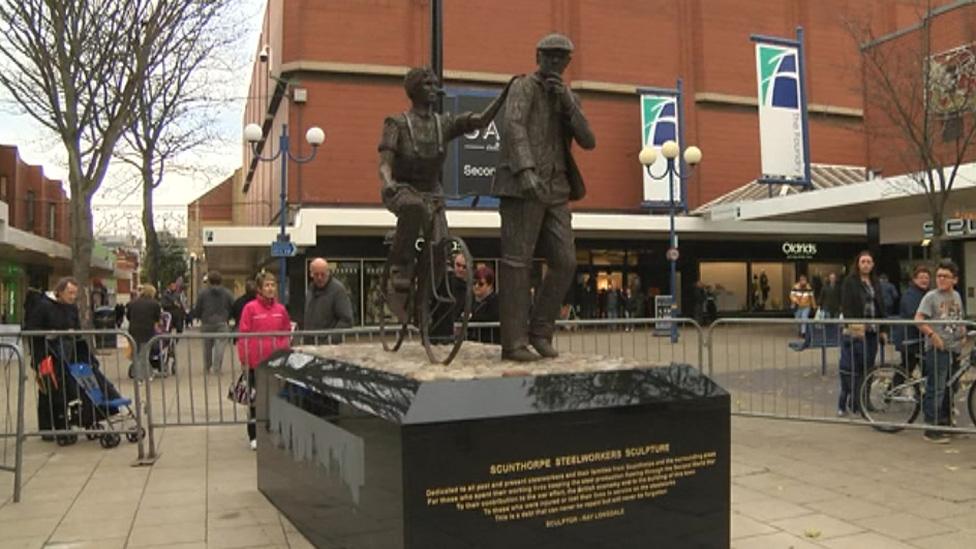British Steel: Scunthorpe responds to threat of 800 job losses
- Published
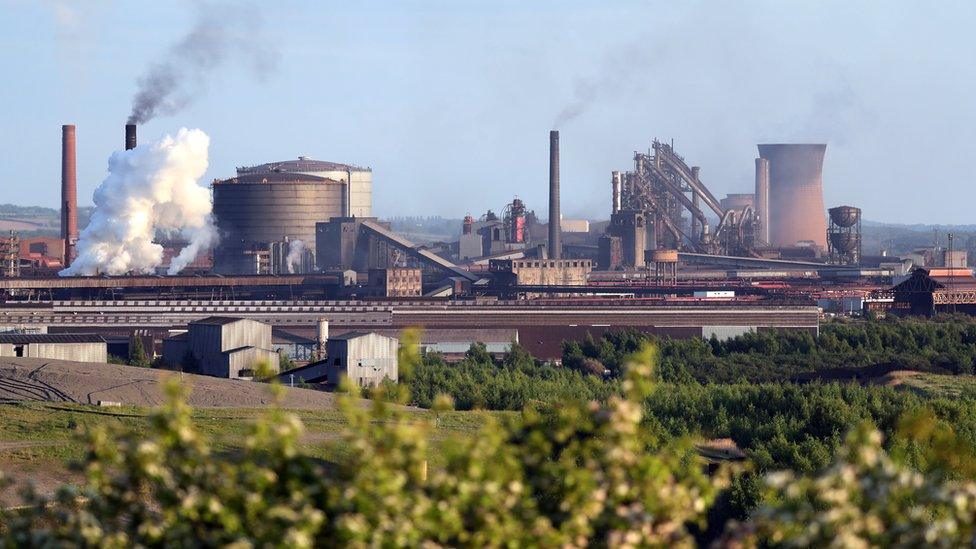
British Steel's Scunthorpe plant looms large on the skyline of the town
British Steel is considering axing as many as 800 jobs at its Scunthorpe plant, the BBC understands. For many residents, the soul of the town is intertwined with the metal it is known for producing. BBC News' Kevin Shoesmith discovers how, in the words of one resident, "everything revolves around steel".
In the compact town centre there's a sculpture, made from Corten - a self-weathering steel - to honour generations of hardy workers.
It depicts a man and a woman returning home with a bicycle after a day's toil.
For hundreds of workers in this small but proud Lincolnshire town facing the threat of unemployment, this rusty installation may now serve as a metaphor; the end of a working day for the end of a way of life.
The soaring towers, chimneys and silos of the steelworks dominate the physical landscape. But it has also seeped, like sweat from the pores of generations of workers, into the soul of this town.
From shopping centres to pubs, many take their name from the industry. The sculpture itself stands in Foundry Square.
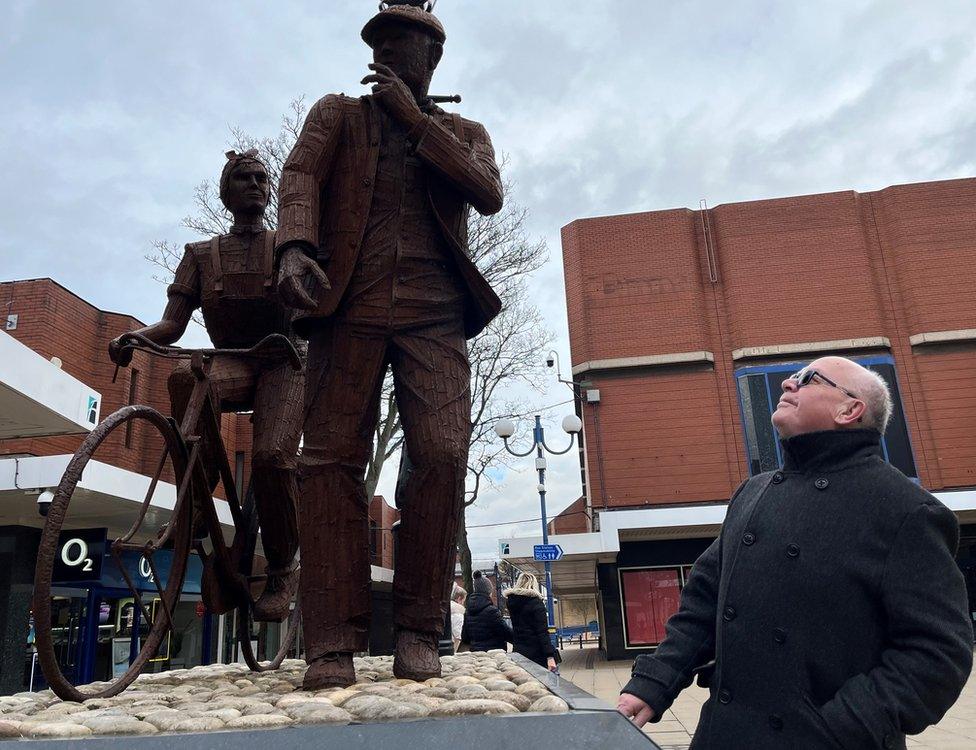
Tony Carter, who chalked up 42 years working in Scunthorpe's steelworks, inspects the town's sculpture
Ray Lonsdale, who crafted the work in 2018, recalls feeling the bond between the town and its chief employer.
He tells me: "It seems like Scunthorpe has grown around the steelworks. I really felt that. From the people I spoke to before, during and after the unveiling, it's clear just how interwoven the steelworks and town are."
But British Steel, now owned by the Chinese group Jingye, has struggled in the face of soaring energy prices.
The BBC understands plans being considered include the possible closure of the coking ovens at Scunthorpe, putting 300 jobs at risk. Hundreds more posts would be reassessed, potentially resulting in around 800 job losses in total.
Tony Carter, 69, is the first person I meet. I noticed how he turned his head towards the sculpture as he walked by; the lingering glance revealing a connection with the steel - just as the sculptor intended.
He tells me he chalked up just over 42 years at the works, before retiring in 2012.
"Scunthorpe will become a ghost town," he warns, looking up at the rusted figures juxtaposed against the grey foreboding sky. "It's sad for Scunthorpe and it's sad for the country."
Opposite the statue, behind the counter of Holland & Barrett, Andrea Jarvis is serving customers. She tells me her husband and their three children all work at the steelworks.
"It seems, to me, we are at this point every few years," she says, resignation in her voice. "If it happens, it will kill Scunthorpe."
Mrs Jarvis paints a picture of a town down on its luck. She gestures towards Oldrids, a department store which closed last year.
She specialises in natural remedies but this one has her stumped.
"I would say to the government they should bail the steel industry out," says Mrs Jarvis. "But how often do you do this?"
A short walk away is Mulligans Sports Bar, where on a Sunday afternoon in November 2019, a delegation from Jingye turned up - out of the blue - and announced to patrons they intended to buy British Steel.
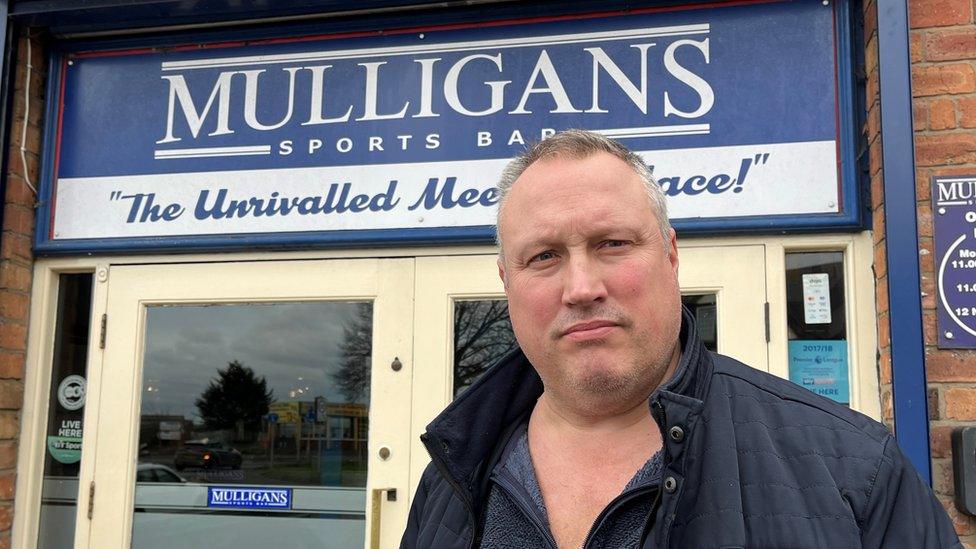
Matthew Crooke, owner of Mulligans Sports Bar, where Jingye announced plans to buy British Steel in November 2019
The deal was confirmed a few months later; Jingye becoming the firm's third owner in four years, with chief executive, Li Hiuming, hailing the "beginning of a new illustrious chapter" in the history of British steelmaking.
Matthew Crooke, the bar's owner, remembers it well.
"Everyone was very pleased," he says, sifting through till receipts. "There was relief too. They decided to buy everyone a drink."
This lunchtime, though, there's no clinking of glasses.
Mr Crooke says: "Looking back on that, it was great. But three or four years down the line we are back to where we were. It's a very uncertain future for everybody.
"We are fearing the worse but hoping for the best."
It's suggested I visit Redbourn Club, where pictures of glowing coke ovens and men in visors, sparks flying, hang on the walls of the lounge.
Chairman Mike Beardsall remembers, in its heyday, the town being home to not one, but four, large steelworks.
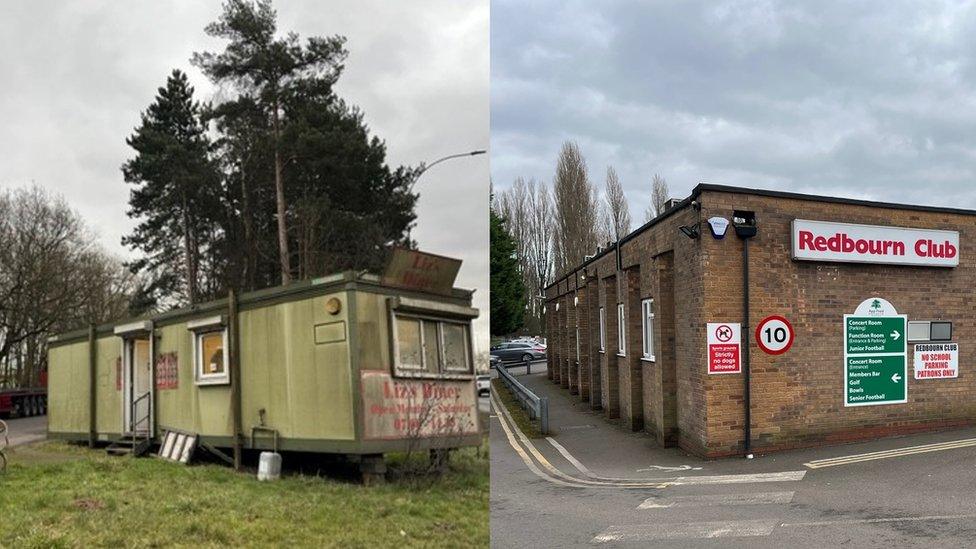
Liz's Diner and Redbourn Club are staples of Scunthorpe life
He tells me the club was built in the 1960s "for the benefit of workers and their families". Still, some steelworkers elect to have their membership fees deducted from their pay.
"Eight hundred is easy enough to say," says Mr Beardsall, referring to the possible job losses. "But that's 800 families - thousands affected.
"Everything revolves around steel in Scunthorpe. It always has done."
But he says the town will not give up its industry without a fight.
"We will keep going," he says, resolutely.
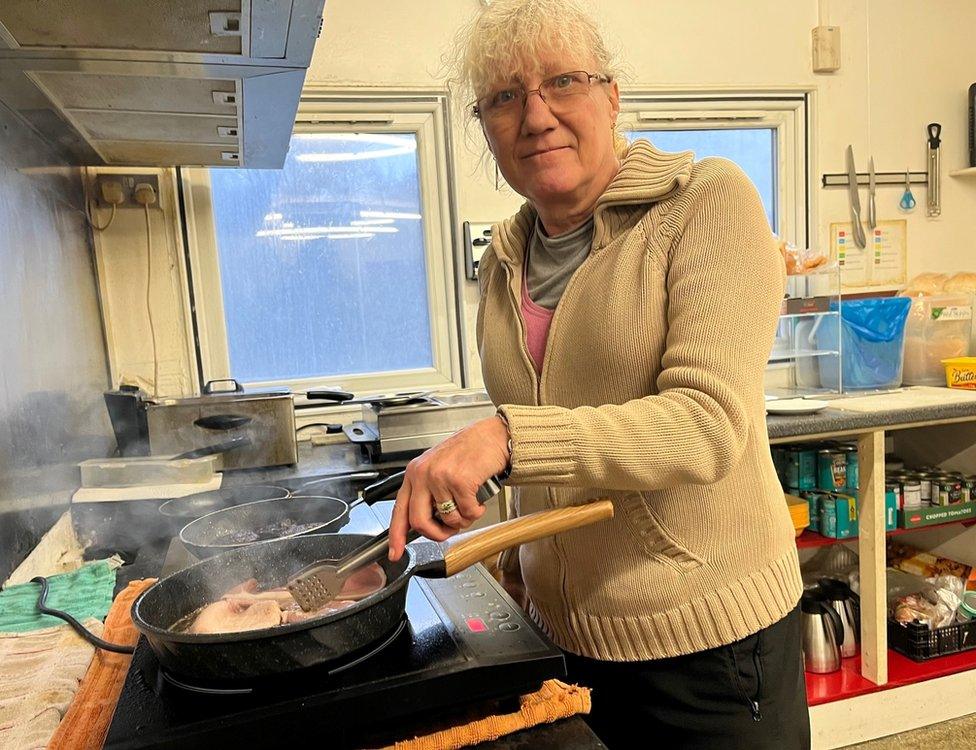
Alicia Pady, owner of Liz's Diner, next door to the steelworks, fears for the future of her business
Heading out of Scunthorpe, in a layby off the A18, is Liz's Diner.
Owner Alicia Pady is knocking up fry-ups for four hungry Geordie lorry drivers. Each has a vehicle parked outside with a slab of metal destined for British Steel's Lackenby site, near Middlesbrough.
"Do you do salads?" one driver jokes, to laughs from other customers and the owner, before requesting black pudding.
Turning to me, Ms Pady says: "Many of these lads have been on the road for hours, so this place is a bit of company for them. We have a laugh and a joke. They all love to make fun of me, as you can see."
Behind the banter, though, Ms Pady admits she is deeply concerned. About 75% of her takings come "from over there", she tells me.
"Anything that happens over there," she says, pointing her stainless steel tongs towards the works. "Has a knock on effect over here."

What British Steel says
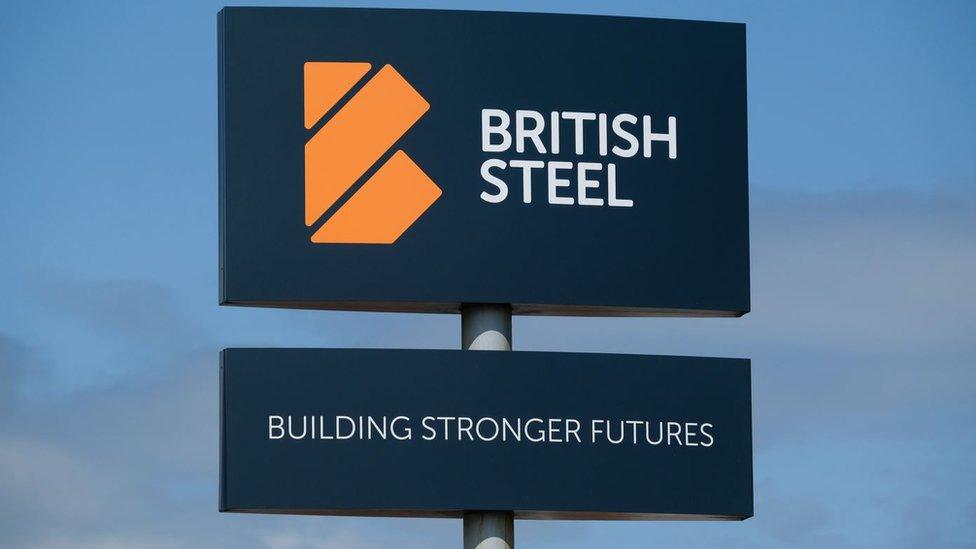
In a statement, British Steel - owned by Jingye - said: "Unfortunately, like many other businesses we are reluctantly having to consider cost cutting in light of the global recession and increased costs.
"We have discussed this in preliminary talks with the trade unions in which we shared the challenges we face.
"We look forward to working closely with them to ensure a long-term safe and sustainable future for the company, thousands of employees and many more in people in our supply chain."
Meanwhile, the UK government said it was committed to securing a "sustainable and competitive future for the UK steel sector".

Follow BBC East Yorkshire and Lincolnshire on Facebook, external, Twitter, external, and Instagram, external. Send your story ideas to yorkslincs.news@bbc.co.uk, external.
Related topics
- Published1 February 2023
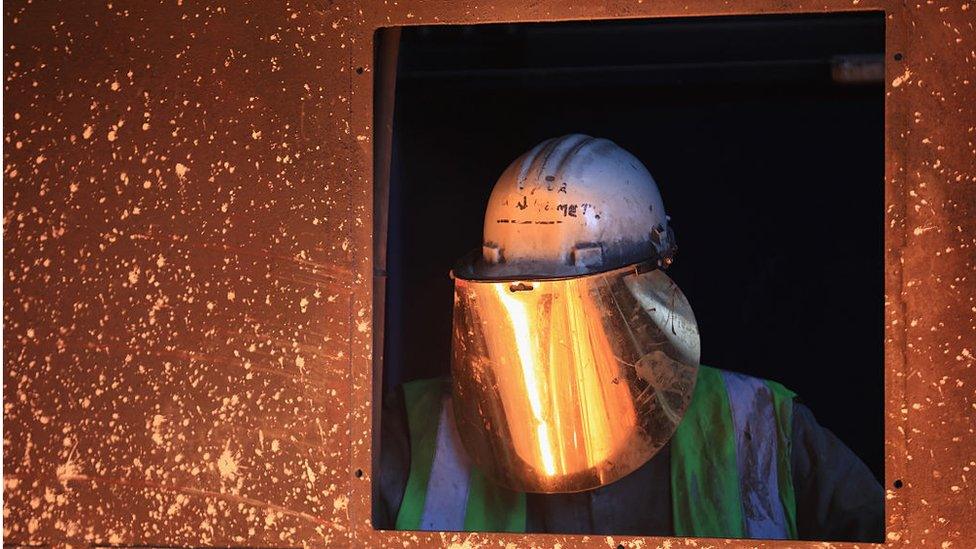
- Published9 March 2020
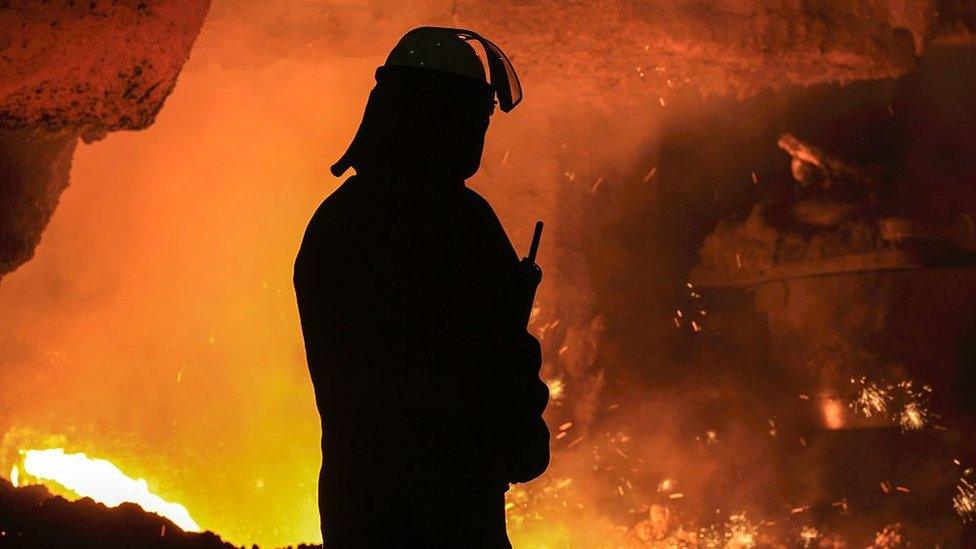
- Published2 July 2019

- Published3 November 2018
